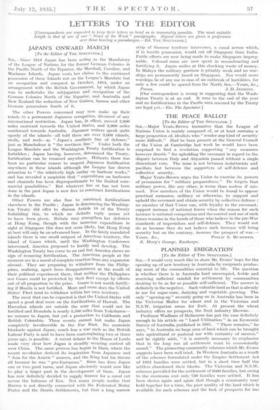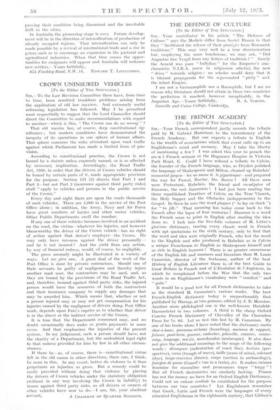PLANNED EMIGRATION
[To the Editor of THE SPECTATOR.]
SIR,—I would very much like to share Mr. Evans' hope for the opening up of new territory in Australia by emigrants produc- ing most of the commodities essential to life. The question is whether there is in Australia land unoccupied, fertile and receiving sufficient rainfall for settlement by communities desiring to be as far as possible self-sufficient. The answer is definitely in the negative. Such valuable land as that is already in use for sugar-cane, dairying and vegetable growing. The only opening-up" recently going on in Australia has been in the Victorian Malice for wheat and in the Victorian and N.S.W. irrigation areas for fruit. At present the wheat industry offers no prospects, the fruit industry likewise.
Professor Wadham of Melbourne has put the case definitely enough in his article on " Land Utilization " in an Economic Survey of Australia, published in 1981. " There remains," he says, " in Australia no large area of land which can be brought into agricultural or pastoral use with certainty of success," and he rightly adds, " it is scarcely necessary to emphasize that in the long run all settlement must be economically sound." The pioneering community schemes which Mr. Evans suggests have been well tried. In Western Australia as a result of the schemes formulated under the Empire Settlement Act of 1922 families were settled, but in a short time half the settlers abandoned their blocks. The Victorian and N.S.W.
schemes provided for the settlement of 8000 families, but owing to the enormous cost only 730 families were settled. It has
been shown again and again that though a community may hold together for a time, the poor quality of the land which is available for such schemes and the lack or prospects for
proving their condition bring discontent and the inevitable drift to the cities.
In Australia the pioneering stage is over. Future develop- ment will be in the direction of intensification of production of already occupied regions. That intensification can only be made possible by a revival of international trade and a rise in prices such as to encourage an expansion in the pastoral and agricultural industries. When that time comes the oppor- tunities for emigrants will appear and Australia will welcome new settlers.—Yours faithfully,











































 Previous page
Previous page